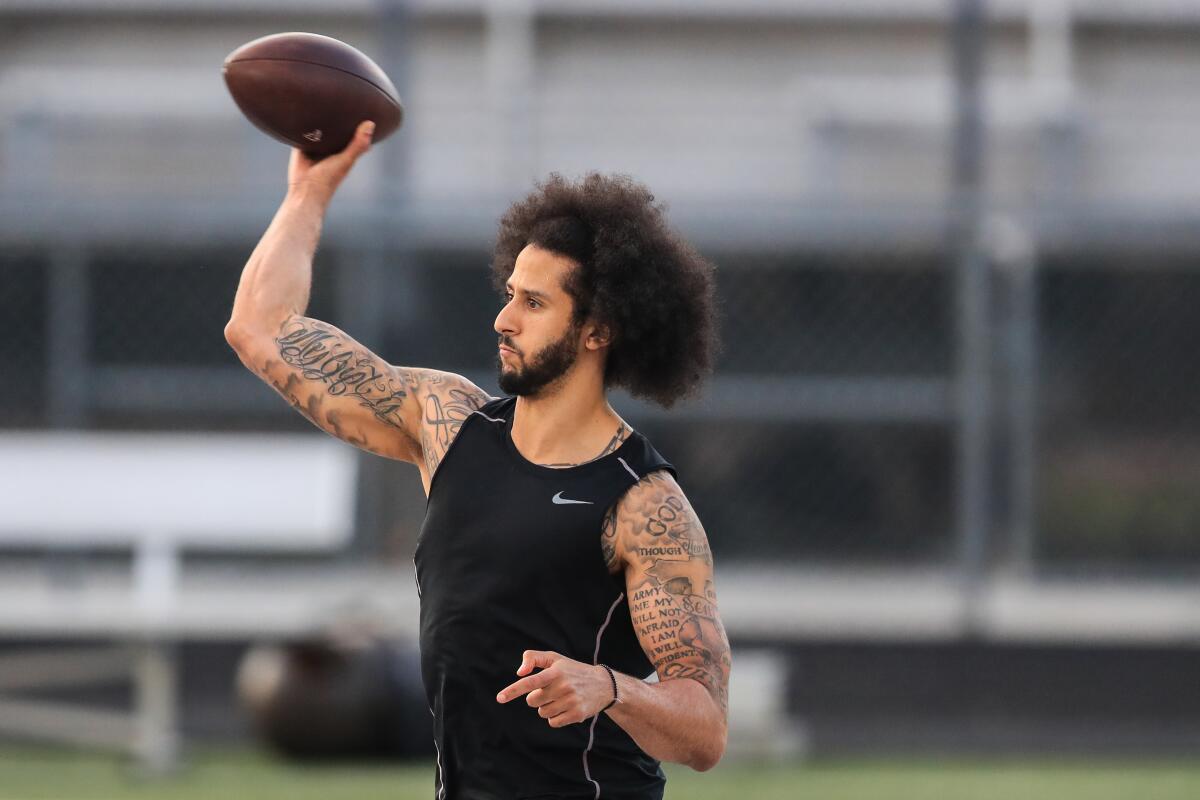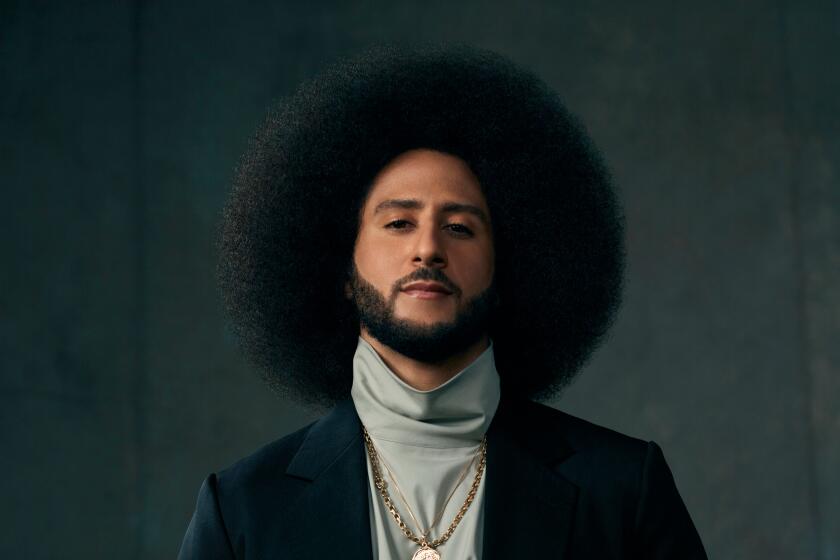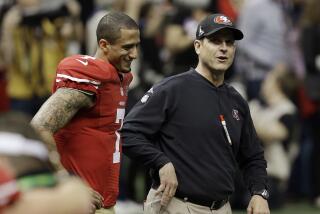Colin Kaepernick’s Netflix biopic leaves out his NFL career. Here’s a refresher

- Share via
The Netflix limited series “Colin in Black and White” depicts, among other things, Colin Kaepernick‘s obsessive drive to play quarterback since his youth.
Despite some eye-popping statistics, though, no NFL team has offered him a job since 2016. Some say that’s because he knelt during the national anthem to protest the inequality of treatment of Black Americans. Others say it’s because he’s not better than any of the 64 or so quarterbacks who turn up on NFL rosters each season. But one thing can’t be denied: Kaepernick’s obsessive drive remains.
“The fire you see in the series has always been there and will always be there,” he told The Times in response to questions about the Netflix biopic, which premieres Friday. “I am still up at 5 a.m., training five, six days a week, making sure I’m prepared to take a team to a Super Bowl again.”
For those unfamiliar with his football career and its abrupt end, here’s a brief timeline.
In the hybrid docudrama ‘Colin in Black and White,’ the former NFL star teams with Ava DuVernay to dramatize his teen years ‘without ambiguity.’
2006-10 — Picking up where the Netflix series leaves off, Kaepernick plays four years at the University of Nevada, Reno (plus a redshirt season). He is the only player in NCAA Division 1 Football Bowl Subdivision (formerly known as Division I-A, the top level of college football in the U.S.) history to throw for more than 10,000 yards and run for more than 4,000 in a career. He and Tim Tebow are the only FBS quarterbacks to rush for 20 touchdowns and throw for 20 TDs in one season. He finishes his college career with a passer rating of 142.5 and a GPA of 4.0.
2011 — The San Francisco 49ers take Kaepernick in the second round of the NFL draft.
2012 — After starting quarterback Alex Smith is knocked out of a game against the Rams, Kaepernick replaces him and guides the Niners to a tie. Accruing a 5-2 record in the team’s remaining regular season games, and setting an all-time quarterback rushing record in a playoff win over the Green Bay Packers, Kaepernick leads the 49ers to Super Bowl XLVII, ultimately losing to the Baltimore Ravens.
2016 — After multiple coaching changes, three preseason surgeries and severe roster depletion, Kaepernick enters a competition for the Niners’ starting QB job with Blaine Gabbert.
In an Aug. 14 preseason game, he remains on the bench (out of uniform) during the national anthem. After the third preseason game, he tells the press, “I am not going to stand up to show pride in a flag for a country that oppresses Black people and people of color. To me, this is bigger than football, and it would be selfish on my part to look the other way. There are bodies in the street and people getting paid leave and getting away with murder.”
Former Green Beret John Boyer reaches out to Kaepernick about the protest and suggests he kneel instead of sitting, a gesture Kaepernick adopts.
Kaepernick regains the starting QB job in Week 6, but the team limps to a 2-14 record. Kaepernick finishes with a 90.7 rating to Gabbert’s 68.4 and a career rating of 88.9. 2016 will be his final season with the Niners.
The complete guide to home viewing
Get Screen Gab for everything about the TV shows and streaming movies everyone’s talking about.
You may occasionally receive promotional content from the Los Angeles Times.
2017 — New 49er head coach Kyle Shanahan indicates that Kaepernick doesn’t fit his intended offensive scheme; rather than be cut, Kaepernick opts out of his contract. He visits the rival Seahawks but leaves without an offer, though Seattle head coach Pete Carroll later says he wishes he had signed Kaepernick. Despite Kaepernick not playing in the 2017 season, his jersey shoots to the top of NFL merchandise sales. At present, he remains without an NFL contract.
2018 — On Jan. 31, Kaepernick announces the completion of his pledge to raise $20 million ($10 million of his own money, with matching funds from celebrities) for social justice and human rights organizations.
President Trump, a vocal critic of NFL players protesting racial injustice through kneeling during the anthem, suggest in March that those who do so should be banned from playing, and “maybe you shouldn’t be in the country.”
2019 — Kaepernick, along with former 49er teammate Eric Reid, settles a grievance against the NFL alleging collusion preventing him from signing with any team. Terms are undisclosed; the Wall Street Journal reports the total sum is less than $10 million.
Kaepernick abruptly relocates a private workout for NFL scouts. Some NFL commentators take the sudden change as evidence that Kaepernick doesn’t really want to play; his agent Jeff Nalley and PR director Jasmine Windham later post a public letter rebutting that narrative, laying out legal issues with the custom waiver the league had required he sign (among other points). The letter also responded to claims that Kaepernick had turned down NFL contract offers and made exorbitant salary demands.
“I can say with 100% confidence that my agent knows the truth better than the detractors,” Kaepernick told The Times.
Present day — Kneeling in peaceful protest has been adopted nationally and internationally by groups and individuals, especially those protesting racism and in favor of human rights. Whole teams, large groups of protesters and even law enforcement have knelt, sometimes together.
More to Read
The complete guide to home viewing
Get Screen Gab for everything about the TV shows and streaming movies everyone’s talking about.
You may occasionally receive promotional content from the Los Angeles Times.








